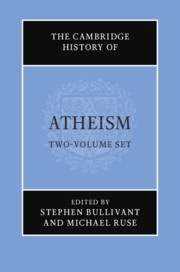Book contents
- The Cambridge History of Atheism
- The Cambridge History of Atheism
- Copyright page
- Dedication
- Contents
- Acknowledgments
- Contributors
- Introduction
- Part I Preliminaries
- Part II Atheisms in History
- Part III Reformation, Renaissance, Enlightenment
- Part IV Classical Modernity: Philosophical and Scientific Currents
- Part V Classical Modernity: Social and Political Currents
- Part VI Twentieth and Twenty-First Centuries: Intellectual and Artistic Currents
- Part VII Lived Atheism in the Twentieth- and Twenty-First Centuries: Case-Studies
- 42 Latin America
- 43 The Road to Modern China
- 44 Contemporary China
- 45 Atheism in India: Twentieth Century and Beyond
- 46 The Soviet Union
- 47 Modern Germany
- 48 The Nordic and Baltic Countries
- 49 United States
- 50 The Pacific Northwest
- 51 Tunisia
- 52 Southern Africa
- 53 Traditional Societies
- Part VIII Emerging Atheisms in the Twenty-First Century
- Part IX Conclusion
- Index
- References
46 - The Soviet Union
from Part VII - Lived Atheism in the Twentieth- and Twenty-First Centuries: Case-Studies
Published online by Cambridge University Press: 25 September 2021
- The Cambridge History of Atheism
- The Cambridge History of Atheism
- Copyright page
- Dedication
- Contents
- Acknowledgments
- Contributors
- Introduction
- Part I Preliminaries
- Part II Atheisms in History
- Part III Reformation, Renaissance, Enlightenment
- Part IV Classical Modernity: Philosophical and Scientific Currents
- Part V Classical Modernity: Social and Political Currents
- Part VI Twentieth and Twenty-First Centuries: Intellectual and Artistic Currents
- Part VII Lived Atheism in the Twentieth- and Twenty-First Centuries: Case-Studies
- 42 Latin America
- 43 The Road to Modern China
- 44 Contemporary China
- 45 Atheism in India: Twentieth Century and Beyond
- 46 The Soviet Union
- 47 Modern Germany
- 48 The Nordic and Baltic Countries
- 49 United States
- 50 The Pacific Northwest
- 51 Tunisia
- 52 Southern Africa
- 53 Traditional Societies
- Part VIII Emerging Atheisms in the Twenty-First Century
- Part IX Conclusion
- Index
- References
Summary
The Soviet project presents the first case in which atheism was not just an abstract philosophical position on the question of God’s existence, but a tool used by a revolutionary state in the service of a political project. This project aimed at nothing less than the transformation of the meaning and order of the world, and for the revolutionary state, one of the biggest threats to this was the continued existence of institutions, beliefs, and ways of life that challenged Soviet claims to a monopoly on truth and power. Guided by Marxist–Leninist theory, the Bolshevik Party that stood at the head of the new Soviet state therefore construed religion as an obstacle to the successful construction of Communism, which made religion not just a theoretical question that needed an answer, but a practical problem that needed a solution. The party turned to atheism to solve this problem.
- Type
- Chapter
- Information
- The Cambridge History of Atheism , pp. 850 - 873Publisher: Cambridge University PressPrint publication year: 2021



